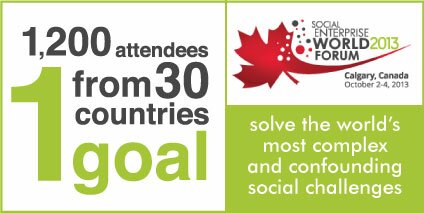“Social Entrepreneurship: How Innovative Change-Makers Are Testing New Solutions to Entrenched Social, Economic and Environmental Problems”
- Georgia Levenson Keohane is speaking at a the SEWF 2103 main stage session "The Future of Social Enterprise: Authors Panel.”
- Readers who enjoyed this article may also be interested in the SEWF 2103 "Social Innovation" program stream, indeed, all of SEWF 2013.
- The feature picture of this article is courtesy of Compfight / A Flickr Search Tool.
There is a revolution going on in the world of social change. Across the nonprofit, private, and public sectors, innovators are expanding how they approach problems through new business models and driving change effectively.
The McGraw Hill Financial Global Institute has issued a new white paper delving into these and a variety of other questions surrounding social entrepreneurship in the United States.
The report by Georgia Levenson Keohane “Social Entrepreneurship: How Innovative Change-Makers Are Testing New Solutions to Entrenched Social, Economic and Environmental Problems,” uses case studies on topics as varied as Teach for America and the government of New York City to illustrate how the social entrepreneurship phenomenon has reshaped the way that human services are delivered.
America has a rich history of entrepreneurship, not just in the capital realm but in the social as well, including the American Red Cross founder Clara Barton and Martin Luther King, Jr. With this foundation, American society is ripe for an increasing reliance on social entrepreneurship, the author writes. For instance, some advocates say that foundations should learn from venture capital models and entities that fund social change should focus on providing more money over longer time frames to fewer organizations and to work closely with grantees to ensure future success.
Commercialization has benefitted philanthropic and nonprofit organizations, reshaping them to better assist their targets. For example, Keohane cites the microcredit industry which harnesses private capital for social purpose by providing small loans made to people who would not otherwise qualify at traditional lending institutions. The notion of microcredit began in the mid-1970s in Bangladesh, and by the early 2000s, commercial investors entered the industry. Today, $65 billion of microcredit loans are made to some 100 million borrowers worldwide, and much of this growth, Keohane says, is due to an infusion of private capital.
Keohane says social entrepreneurship has been around for years but this new activism is growing given its momentum, sweep and fundamental approach to problem-solving. She eyes an even bigger future for social entrepreneurship in the decades ahead, citing innovations in philanthropy, such as an increased emphasis on measurement and evaluation, the role of technology and the growth of nonprofit investment funds.

Georgia Levenson Keohane
“The coming years will mark new inroads for social entrepreneurship, with better defined solutions for government and private leaders to collectively work together towards broader social change and shared prosperity.”
To download the full report, click here.
More About Georgia Levenson Keohane
Georgia Levenson Keohane is a Fellow at the Roosevelt Institute, where she works on a range of issues in economic policy, including poverty and inequality, employment and job growth, and social entrepreneurship and the role of firms in society. Keohane’s career has bridged the private and nonprofit sectors. A former McKinsey consultant and foundation executive, she advises a number of organizations including philanthropies, educational entities, community development agencies, and think tanks. She has taught at Yale, and is an adjunct professor in the Social Enterprise Program at Columbia Business School. Keohane writes regularly on social and economic policy and the intersection of business and society for the Harvard Business Review, The Nation, The American Prospect, The Washington Monthly, Slate, and other publications and is the author of Social Entrepreneurship for the 21st Century: Innovation Across the Nonprofit, Private and Public Sectors (McGraw Hill 2013). She holds a BA from Yale University, an MBA from Harvard Business School, and an MSc from London School of Economics, where she was a Fulbright Scholar.







